|
|
|
Sort Order |
|
|
|
Items / Page
|
|
|
|
|
|
|
| Srl | Item |
| 1 |
ID:
141218
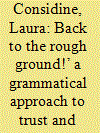

|
|
|
|
|
| Summary/Abstract |
This paper asks what it is that we are doing when we talk about trust in international politics. It begins by reviewing the recent and growing body of research on trust and International Relations (IR). It claims that the existing literature is based on particular practices of representation that unquestioningly attempt to find the correct meaning for trust and that this representational account of meaning limits the form of the research, carrying assumptions about meaning that lead to several semantic and methodological problems. The paper challenges this way of understanding through the use of Ludwig Wittgenstein’s Philosophical Investigations and proposes an alternative, grammatical approach to trust and IR based on ‘meaning as use’. To illustrate this, the paper then conducts a grammatical investigation of the use of trust regarding nuclear arms control with the Soviet Union during the second term of the Reagan presidency. This challenges the familiar narrative of the role of trust at this time by going back to the ‘rough ground’ of President Reagan’s speech on trust and nuclear weapons.
|
|
|
|
|
|
|
|
|
|
|
|
|
|
|
|
| 2 |
ID:
141216
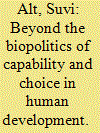

|
|
|
|
|
| Summary/Abstract |
International development is one of the primary biopolitical problematics of the 21st century. Yet, biopolitical critiques of ‘human development’ tend to leave the framework’s ontological underpinnings largely unexplored. This article seeks to remedy this gap by problematising the notions of ‘capability’ and ‘choice’ in human development through an engagement with Martin Heidegger’s critique of the metaphysics of modernity. The article argues that underlying human development is an ontology that enframes human beings as a contingent, orderable, and calculable reserve of capabilities. The enframing of choice in turn conceals the limitedness of the conditions within which choice can happen. As opposed to such liberal choice, the article puts forward an ontological notion of ‘decision’, which entails understanding the world as an openness that resists any final determination of being. A politics that draws its involvement in the world from the openness of being entails the ability to question critically even benevolent and supposedly emancipatory projects when they lack recognition of their own ontological commitments and of the limitations that those commitments impose on people’s lives. A re-politicisation of human development thus requires exposing the paradigm’s ontological limits, but it also demands practical political engagement in the factical situations that beings inhabit.
|
|
|
|
|
|
|
|
|
|
|
|
|
|
|
|
| 3 |
ID:
141215
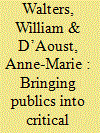

|
|
|
|
|
| Summary/Abstract |
Publics are an undertheorised and somewhat marginal presence in critical security studies. This article argues that a better understanding of publics can advance our understanding of the governance as well as the contestation of security regimes and practices. We develop this argument in three parts. First, we discuss the marginality of publics in critical security studies while highlighting those limited instances where publics have been engaged. Second, we direct attention to emerging research on publics in cognate disciplines, focusing in particular on the literature about material publics. We distil from this work some useful lessons for security studies. In a final section we suggest two research moves for promoting a stronger focus on publics within critical security studies. We conclude that a focus on material publics can furnish security studies with a better understanding of the phenomenon of politics.
|
|
|
|
|
|
|
|
|
|
|
|
|
|
|
|
| 4 |
ID:
141222
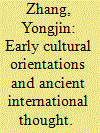

|
|
|
|
|
| Summary/Abstract |
A short commentary on Martin Wight’s ‘The Disunity of Mankind’, a short and unfinished piece in which Wight focuses almost exclusively on the Western tradition of thought, from Plato and Aristotle, to the Stoics and to Augustine.
|
|
|
|
|
|
|
|
|
|
|
|
|
|
|
|
| 5 |
ID:
141217
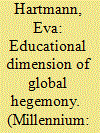

|
|
|
|
|
| Summary/Abstract |
This article seeks to further strengthen a sociological turn within International Relations (IR), which aims to make classical social theory fruitful for analysing the transnationalisation of societies. The focus is on the contribution of Antonio Gramsci’s analysis in this regard. A number of scholars have transferred his theory of hegemony to the global level in order to gain a more sophisticated understanding of global power and its transformation in reaction to the deepening of global economic integration. Surprisingly, most neo-Gramscian scholars have devoted little attention to education, despite the importance Gramsci assigned to this social sphere. The article seeks to overcome this lacuna with a study of the internationalisation of higher education since the end of the Second World War. Against the backdrop of the insights this case study provides, it will suggest some modifications of the neo-Gramscian account of hegemony with a view to taking the sociological turn more seriously, and to deepening our understanding of the social quality and the scale of the emerging postnational hegemony.
|
|
|
|
|
|
|
|
|
|
|
|
|
|
|
|
| 6 |
ID:
141213
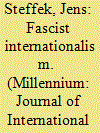

|
|
|
|
|
| Summary/Abstract |
In 1934, the Italian diplomat and scholar Giuseppe de Michelis (1872−1951) published a programmatic book that in English was called ‘World Reorganisation on Corporative Lines’. In this study, de Michelis suggested transferring the socio-economic model of fascist Italy to the global level. He thus envisaged global economic governance by a powerful international organisation and a strict limitation of national sovereignty over the factors of production. My purpose in this article is to explore these largely forgotten proposals as well as the ideological context from which they emerged. The fascist internationalism of de Michelis was technocratic and dirigist, enthusiastic about the possibilities of public planning and the virtues of bureaucratic organisation. This is why his suggestions resembled, in some important respects, world order proposals made by liberal internationalists during the same period. The lesson for International Relations theory is that blueprints for international institutions can be connected to a wide variety of political ideologies. There is no reason to believe that any tradition of political thought is necessarily and eternally committed to internationalism, while others are principally hostile to it.
|
|
|
|
|
|
|
|
|
|
|
|
|
|
|
|
| 7 |
ID:
141214
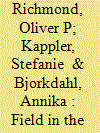

|
|
|
|
|
| Summary/Abstract |
This article highlights the semantic and socio-political meaning of the ‘field’ as it is used in both academic research and policy practices: as a geographic and material space related to forms of intervention in International Relations (IR), and not as a disciplinary space. We argue that the notion of the ‘field’ carries colonial baggage in terms of denoting ‘backwardness’ and conflictual practices, as well as legitimising the need for intervention by peacebuilding, statebuilding, and development actors located outside the field. We also show how academic practices have tended to create a semiotic frame in which the inhabitants of the research and intervention space are kept at a distance from the researcher, and discursively stripped of their agency. Along similar lines, policy-practice has reinforced the notion of the field as being in need of intervention, making it subject to external control. This article suggests that the agency of the inhabitants of the field has to be re-cognised and de-colonised so that political legitimacy can be recovered from ‘intervention’.
|
|
|
|
|
|
|
|
|
|
|
|
|
|
|
|
| 8 |
ID:
141224
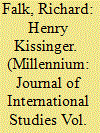

|
|
|
|
|
| Summary/Abstract |
Henry Kissinger the supreme scholar/statesman of the late 20th century has authored a comprehensive interpretation of world order that revises his earlier West-centric orientation. This essay review assesses Kissinger’s view that there is a need for a new consensual world order that enjoys the participation and real consent of such important non-Western political actors as China, India and the Islamic World (viewed as a totality). Implicitly, Kissinger realizes that in the post-colonial world purely European conceptions of world order will no longer provide stability, but he nevertheless believes that only by the pragmatic ‘reinvention’ of these conceptions by the whole world will it be possible to achieve a stable and legitimate world order.
|
|
|
|
|
|
|
|
|
|
|
|
|
|
|
|
| 9 |
ID:
141223
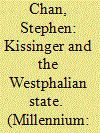

|
|
|
|
|
| Summary/Abstract |
Despite seeming to express an openness towards the world, Henry Kissinger’s new book, World Order: Reflections on the Character of Nations and the Course of History, is in fact deeply conservative in terms of his adherence to the Westphalian state as the desirable actor in International Relations, and almost as a normative condition of the world’s architecture. Kissinger sketches his views of different regions of the world, but these views are derived from his past experience more than a nuanced and forward-looking view of a rapidly changing world.
|
|
|
|
|
|
|
|
|
|
|
|
|
|
|
|
| 10 |
ID:
141225
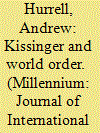

|
|
|
|
|
| Summary/Abstract |
Kissinger’s World Order: Reflections on the Character of Nations and the Course of History provides a powerful restatement of many of themes that have run through Kissinger’s previous writings, his commentary on international affairs, and his own view of the practice of own diplomacy. The book displays Kissinger’s capacity for grand synthesis and his ability to weave together a vast range of material into a coherent overall pattern. It is surely correct in pressing the case for taking the return of geopolitics seriously and for recognising the importance of different ways of seeing the world and of interpreting world order. But it is deeply flawed in the manner in which the themes of power and values are treated and in the moral and political lessons that are drawn from the analysis.
|
|
|
|
|
|
|
|
|
|
|
|
|
|
|
|
| 11 |
ID:
141220
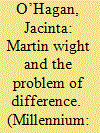

|
|
|
|
|
| Summary/Abstract |
In the ‘Disunity of Mankind’, Martin Wight addresses a recurrent dilemma in Western thought: how do we reconcile conceptions of human community with those of human diversity? The ways in which diversity is understood and the meanings attached to difference has significant implications for political orders and human interaction. The deployment of difference can generate both sites of contest, and the permissive conditions for particular forms of political action. Wight’s dilemma remains highly salient today. We continue to struggle intellectually, ethically and politically to reconcile claims of a universal human community with the plurality of human societies. Whilst we ostensibly value diversity, we still persistently constitute difference through producing dichotomies that generate both moral and political hierarchies and boundaries, which in turn form significant features in the landscape of contemporary world politics.
|
|
|
|
|
|
|
|
|
|
|
|
|
|
|
|
| 12 |
ID:
141221
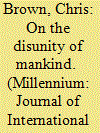

|
|
|
|
|
| Summary/Abstract |
Martin Wight’s fragmentary comments entitled ‘The Disunity of Mankind’ are by no means a major work, but they are interesting in the context of contemporary cosmopolitanism and in terms of helping us to assess the substantive content of Wight’s approach to International Relations.
|
|
|
|
|
|
|
|
|
|
|
|
|
|
|
|
| 13 |
ID:
141219
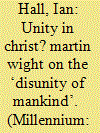

|
|
|
|
|
| Summary/Abstract |
This response to Martin Wight’s ‘Disunity of Mankind’ contextualises the essay in his wider thought and explores the Christian underpinnings of his thinking on cosmopolitanism. It argues that the essay demonstrates both Wight’s strengths – in terms of his forensic analysis of a broad range of Western texts – and his weaknesses, which flowed from his conviction that the Christian tradition, and Western values more broadly, were the best foundation for international society.
|
|
|
|
|
|
|
|
|
|
|
|
|
|
|
|
|
|
|
|
|